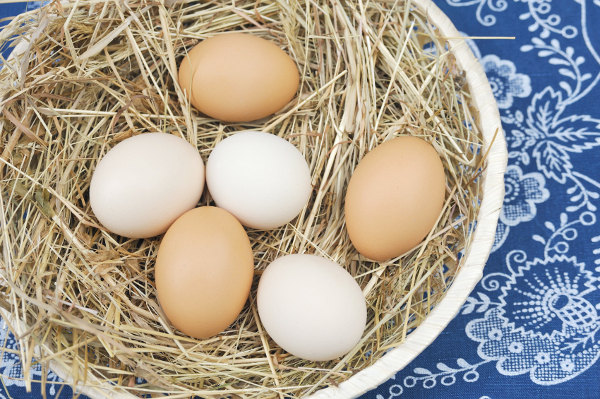The most reliable and fun way to start breeding chickens is with fertilised eggs from your own chickens. Obviously, you can only do this if you have a cockerel and hens. Here are some simple tips which can maximise the chances of success when using your own eggs:
Collect Your Eggs Regularly
If you have been collecting eggs for eating you might be used to collecting them once a day. However, if collecting eggs for breeding, it is a good idea to collect your eggs twice or even three times a day. This ensures that the eggs don’t get dirty and that the hen doesn’t accidentally start them developing by sitting on them.
Collect your eggs in something soft.
Handle the eggs very carefully
When you collect the eggs from the nest box you should be very careful not to jar, bang or crack them. This can damage the membrane and internal parts within the egg itself. You should also take care not to leave them in the sun or in the cold. It might sound quaint but collecting your eggs in a basket with some straw in the bottom will help keep them safe and stop them from rolling around or cracking. You should also make sure that you hands are clean when handling the eggs so that you don’t pass on any bacteria. The best way to do this is using anti-bacterial wipes.
Keep the nest box clean
It is generally considered good husbandry to keep your chickens’ nest box as clean as possible but it is especially important if you are planning to use the eggs for hatching. This helps reduce bacteria (from mud or droppings) affecting the fertility of the eggs. You should ensure the nest box has plenty of fresh straw or poultry bedding.

Date stamping kits for eggs.
Keep track of your eggs as you collect them.
If you have a mixture of different breeds of chickens or are collecting eggs over a number of days, it’s worth while marking the eggs with a date and breed. You can use a pencil, marker pen or an egg dating kit.
Storing your eggs
You can store fertile eggs for up to 7-10 days before incubating them. You should try to keep them between 12 degrees C and 15 degrees C in a draught free place. This slows down the cell division and ensures that the eggs don’t lose too much moisture through their shells. Regardless of how keen you are to get started, you must wait at least 24 hours before starting to incubate an egg because otherwise it might not hatch. While you store them you should ensure that the eggs are turned every day. The easiest way of doing this is to store your eggs in an egg box or egg tray with the sharp end of the egg pointing downwards. You ‘turn’ them by tilting the tray or box to one side using a block of wood under one side. Simply move the block of wood to the opposite side each day and it will keep the eggs in good condition.

Store your eggs on a tray and use a wooden block to rock them backwards and forwards each day.
Cleaning Eggs
The temperature inside an incubator is the perfect temperature for breeding chicks but unfortunately it is also the perfect temperature for breeding bacteria too. However, you should avoid over cleaning your eggs because this tends to remove both the dirt and the outer cuticle from the egg as well. This can leave the egg at greater risk from bacterial contamination in the future.

You should clean your egg using egg wash.
If you find that your eggs are slightly dirty you can clean them by scraping off mud with a clean knife or cloth. If the eggs are very dirty you should wash them in a bowl of warm water (at 35 degrees C) with a small amount of special egg wash and dry them with a clean kitchen towel. The water temperature is very important, and you should never let the eggs soak for more than 2 minutes. You should take care not to jar or bang the eggs and some people place a sponge or piece of cloth in the bottom of the bowl to avoid the egg being banged on the bottom of the bowl.
Feed your chickens and cockerel good quality chicken feed.
To ensure that your chickens are producing high quality eggs and your cockerel has high quality sperm - you should ensure that you give your chickens the best quality chicken feed. However, if you chickens like free ranging around the garden and eat other food, you can supplement their diet with extra chicken grit and poultry spice.

Comments
Odayevuh, 17 April 2020
I am venturing into poultry business and would like to be having my eggs hatched my self. My question is, 1. What is the particular breed of cocerel that are use for breeding pullet, cocerls and boilers eggs. 2. Where do I get them?
Akntola, 20 April 2019
I am a prospective entrepreneur in poultry business and would like to be having my eggs hatched my self. My question is, do u have a particular breed of chicks that are use for breeding boilers eggs. And how do I get them?
Mubiru, 24 October 2018
just want to know what rooster should i use to mount my hens ?
Karen, 8 June 2016
I've got a broody hen at the moment and would like to put some fertilised eggs with her so she hasn't had a waste of time! Do you have any addresses of people who could provide me with some in the east Leicestershire area please? Thanks
Anhar, 1 June 2016
Hi, I live in East London. I wanted to purchase some fertilized chicken eggs. As I have a chicken which in brood. Please assist me where to buy and can I purchase delivered. Thanks Kind regards Anhar Jabbar